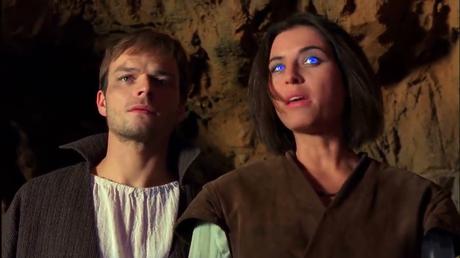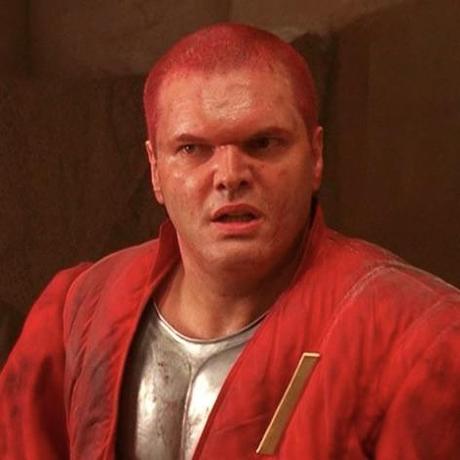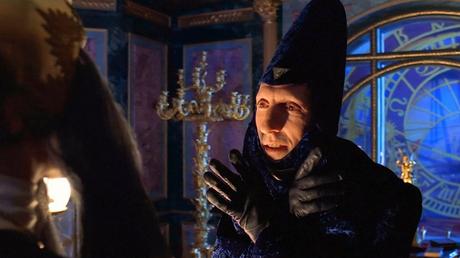 Paul (Alec Newman) and Chani (Barbora Kodetova) in the Water of Life sequence from 'Dune' (2000)
Paul (Alec Newman) and Chani (Barbora Kodetova) in the Water of Life sequence from 'Dune' (2000)
Upon Jamis' death, one that young Paul unknowingly brought about through ignorance and restraint, a religious ceremony is performed. Dialogues, gestures, prayers for the deceased, remembrances of great deeds - these are part of the ritual for paying homage to a courageous warrior.
The most important aspect of the ceremony, however, is extracting the dead man's water from his remains - a process of dehydration whereby the surviving tribe members reclaim his life essence. In no way is this deemed to be a selfish act. Quite the contrary: Paul, in this case, will keep the dead man's water not for himself but for the good of the tribe. It will be reserved and conserved for future use, in the event it is needed during troubled times.
Riding the giant sandworm is next on the agenda of things one must do as a Fremen. In fact, it is a Fremen tradition, one that Paul must master if he's to be considered one of their own. We cut to a temple at Sietch Tabr, a holy and ancient shrine carved from the side of a mountain. A huge statue has also been sculpted from the rock formations.
Similar to how the male Fremen mourned Jamis' passing, Chani too mourns her father's demise. He was Dr. Liet Kynes, Arrakis' planetologist and spiritual keeper of the Dune flame. Away from prying eyes, the sad-eyed Chani takes Paul deeper into the bowls of the planet's core, its base of operations if you will; a secret undercover path whereby he will bear witness to the Fremen's plan for transforming the planet into a watery haven.
Bas relief carvings in and along the caves tell the history of Arrakis, as Chani leads Paul through the winding passageways. Water, the source of all life, is abundant here, a massive reservoir that has been captured from every known source, including the human kind. Paul continues to see visions of hooded Fremen, calling to him and swaying to the sound of his name: "Muad'Dib, Muad'Dib."
We transition to planet Kaitan, where Princess Irulan directs one of her handmaidens to serve as the Baron's nephew, Feyd's concubine (in reality, the servant will report directly to Irulan). Next, we see a platoon of Sardaukar soldiers searching for the Fremen's whereabouts. Suddenly, a swarm of Fremen emerge from the ground, the ungrateful dead coming back to life. They attack and methodically kill the unsuspecting Sardaukar, reports of which enrage an already infuriated Rabban.

To seek revenge for this outrage, red-faced Rabban purposely executes a line of captured Fremen rebels as an example to all. As each in turn are slain before the populace's eyes, they die with Muad'Dib's name on their lips.
Wouldn't you know it, but word of Rabban's (ahem) "excesses" reaches Uncle Vladimir Harkonnen's ears. He admits to putting up with his wayward nephew's behavior in order to clear the way for his smoother yet no less ruthless relative Feyd. He will show no mercy, the Baron charges him; he will bleed and squeeze the Fremen dry of their potent spice and, we are assured, of their very lives. Nice bunch of guys, those Harkonnen boys!
Opium of the People?Back at the sietch, a blue-eyed Stilgar (by the way, it's the spice that turns the Fremen's eyes blue) calls Muad'Dib out to fight to the death. Leadership demands it! Tsk, tsk, such a waste of talent. But it's only another of young Paul's visions. He's seen far too many such visions of late.
The director's commentary grows to encompass what it means to physically change the planet. Sadly, it will spell the end of the inhabitants' way of life, of surviving by their wits in the open desert, by turning Arrakis into Elysium, a Nirvana or near-heaven on earth - a fascinating paradox to their story. But the change will come, as inevitable as the rising sun.
It was Karl Marx who famously wrote, in 1844, that religion was the "opium of the people." So, is the spice, in this sci-fi context, the opium of the Fremen? An addictive drug consumed to keep the Fremen complacent, to keep them distracted from their harsh lifestyle and warring ways? And committed to a false narrative about a prophet on the horizon who will pave the way for their rescue? Who will deliver them from evil and "capitalist oppression," in the manner of a Moses or a Joshua? Or, in this case, a Muhammad leading them to Paradise?

Joseph Cronin, a postdoctoral research associate at the German Historical Institute in London, wrote a May 2018 essay for the London School of Economics expounding upon what Marx actually meant by the above phrase. He prefaced his essay by prefacing Marx: "Religion is the sigh of the oppressed creature, the feeling of a heartless world, and the soul of soulless conditions."
Does this mean that religion, for the desert people above, "mirrors the inequalities of the society in which it exists, so the poor become the virtuous, the wealthy will find it difficult to enter heaven," etc.? Is religion a form of "wish-fulfilment fantasy"?
Seen in the spirit of novelist Herbert's achievements, and in our present precarious state of world affairs, Cronin makes the valid point that, "For Marx, the ultimate aim of the fight against religion is not religion itself, but rather the type of society which causes the suffering which creates the need for religion in the first place. Religion is therefore an understandable but misguided response to the suffering caused by exploitation in feudal and capitalist societies."
That certainly makes sense here: Herbert's world building was solidly based on medieval feudal societies. But how does the all-powerful allure of the spice figure into this analysis? Dr. Cronin has a response to that as well: "To engage with the metaphor directly: if you are under the influence of opium [our modern-day alternative for "spice"] then you are detached from reality. And you take opium precisely for this reason - because you don't want to face reality. Because you are in pain, or because your circumstances have become impossible to deal with any other way.
"Religion, as a kind of spiritual opium, prevents people from realizing that their suffering is not the 'natural' state of affairs that will be rectified after death, but a material situation that can be changed in this life. To achieve this realization, however, people first need to throw off religion because its very purpose is to make them accept their subjugation by preventing them from understanding their true situation."
Not to give anything away, but in the end Muad'Dib, by way of using religion, becomes a killer - a very efficient one, to give him his due, and a born leader of men. In writer-director Harrison's words, "There's nothing sentimental about it." This rather sober assessment of Paul's attributes, along with Dr. Cronin's detailed dissection of Marx's pronouncement about religion, appear somehow to "justify," if that's the appropriate term, our hero's actions, but only in the light of Dune 's storyline. Which is, to evildoers much evil will come. Not just to those who do the evil deeds, but to their followers as well.
In the Dune universe, evil deeds are performed on a regular basis. And the perpetrators will either be rewarded or condemned for their brutal acts. Would we consider these acts to be a "just cause"? Forgiveness does not enter into the picture, nor is religion discarded altogether, not to any degree. If anything, it continues to be used and abused.
Trouble in ParadiseA representative of the Spacing Guild (actor and juggler Philip Lenkowsky), an oddly shaped Thin Man in a tall pointy hat (or a cone-head?), meets with Reverend Mother Mohiam to complain about the spice not flowing as it should. The reason, of course, are those constant Fremen raids, which have disrupted the normal flow. Of course, the spice's scarcity hampers the Spacing Guild's control of the folding of space and, more crucially, of commerce.

Yes, they need the spice to fill their coffers, a guaranteed source of lucre. And, yes, the spice must flow, the cost be damned.
Conversely, the elderly Mother Ramallo (Drahomira Fialková) from the southern sietch, a Fremen woman of all things, decides to call on the former Lady Jessica. She tells Jessica that, yes, she is familiar with the myths of the off-worlder, but that she and Paul can abuse the privilege. They are playing with fire is what it boils down to.
As one can overdose on too much opium, one can go overboard with playing the messiah. The people can tolerate only so much, the rest is mere manipulation of events, of politics, of religion, of causes both worthy and unworthy, just and unjust. Yet, they must remain off the radar and in the background; the unseen power behind what is happening on a day-to-day basis.
It's remarkable to note that nothing transpires without the Fremen knowing about it. Pretenses must be kept up, though, otherwise the whole system will collapse. "A legend that protects you," the aged Mother Ramallo admonishes to Jessica, "can also destroy you."
Paul's journey of discovery is only the beginning of the trials he is fated to endure. He learns that the worm is the spice, and the spice is the worm. This is the Fremen's carefully guarded secret. Spice, the opium of the people (the literal opium, it turns out), a highly addictive palliative that can extend life, can also take it away. Take the spice away and you will have a mass withdrawal.
For the Fremen, spice is a sacrament. To cite its religious connotations, spice is the bread of life. It can also represent the body of Christ (in the Catholic and Eastern Orthodox faiths, of course). In Dune, the spice will allow Paul to transform into the Kwisatz Haderach, the one who can see both the future and the past, all at once. "There is no time," he reflects, "it is all of the moment."
This observation can be found in numerous classic and modern science-fiction tales, the most recent being author Ted Chiang's 2002 collection Stories of Your Life and Others, one of which was turned into Denis Villeneuve's film Arrival (2016), where time is not structured in an orderly fashion but is omnipresent and all around you.
Meanwhile, Princess Irulan visits the glowing red Giedi Prime, the dreaded Harkonnen home world, where she is treated to the spectacle of a muscle-bound Feyd Rautha (Matt Keeslar) beating up and disposing of some bush league opponents. Not in battle, mind you, but in exhibition matches. Talk about a controlled environment!

In a similar breadth, the slinking Count Fenring (Miroslav Táborský), the emperor's sly righthand man, listens to the Baron's flimsy assurances that everything is under firm control. No spice problems at all, he contends. Sure, Baron, sure.
Back on Arrakis, the sacred ceremony of milking a worm takes shape. Two men hold a baby worm (!) as it regurgitates the spice into a waiting basket. As all this is happening, over on Giedi Prime Irulan enters surreptitiously into Feyd's dressing room to take over duties from her bald-pated spy. Irulan spreads the oils and herbs over Feyd's physically gorgeous form. But while she does this, she gets Feyd to fess up to her what's been happening with the spice and what plots the evil Baron has concocted. Her main mission, then, is to ferret out what future intentions he has with respect to Arrakis.
This is juxtaposed with the Water of Life ritual, whereby the elderly Mother Ramallo passes on while Jessica inherits her visionary powers. To do this, Jessica must ingest the spice that's just been harvested. Her doing so results in an unforeseen problem, that of her unborn daughter, Alia, inheriting her Bene Gesserit powers and more so.
Jessica too vomits out the poison, which was mixed with the spice inside the worm's innards. Only her Bene Gesserit powers could have transformed the poison into spice (similar, in many respects, to the transformation, or transubstantiation, of the bread and wine at Eucharist into the body and blood of Christ). Contrasted with the sexual orgy on Giedi Prime, and later the rather tame celebration of life on planet Arrakis, these acts mimic one another: religion and the sexual act, one observes, are mixed, one blessed, one not; one that achieves a higher purpose, the other of self-gratification.
In the midst of the Fremen's orgiastic partying, Paul finds himself among the participants. Instantly, the celebrants are replaced by dead bodies, with blood-red trans lights illuminating the carnage. Paul's hands are red with blood, a ghastly sight indeed. In the next instant, he awakens with a start. He's in bed with Chani. He has seen his path, the one that must be taken. The way is set, the path is clear. Violence, then, is the only solution. Redemption, if it ever comes, will have to wait.
"The saga of Dune is far from over...."
(To be continued...)
Copyright © 2022 by Josmar F. Lopes
